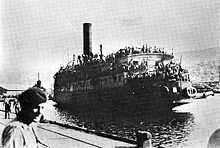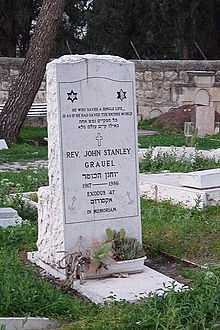John Stanley Grauel
John Stanley Grauel (1917 – September 1986) was a Methodist minister and American Christian Zionist leader. He was a crew member of the famed refugee ship the SS Exodus-1947 and a secret "Haganah" operative. Grauel is credited with being the key individual who persuaded the United Nations Special Committee on Palestine to recommend for the Partition Resolution of November 1947, creating the State of Israel. In a speech to the Jewish Agency, Golda Meir, referred to his testimony as the first appeal by a “priest, a perfectly worthy gentile, a priori, no Jewish witness was to be believed.”
Early life and education
John Stanley Grauel was born in Worcester, Massachusetts, in 1917. He completed his education in 1941, graduating from the Theological Seminary, Bangor, Maine, as a Methodist Minister.
Assisting Holocaust victims
Grauel became very aware of the European Holocaust and the Zionist movement in 1942 through his close friendship with Judge Joseph Goldberg of Worcester. Also in 1942, he joined the America Palestine Committee, which was dedicated to the establishment of a Jewish state. In 1943 he gave up the local ministry to assume a position as a director of the committee's Philadelphia office. In 1944, attending his first Zionist meeting he met David Ben-Gurion, the Zionist leader and future prime minister of Israel. Grauel learned of the Haganah, the Jewish underground army in Palestine, and the longtime humanitarian efforts of the Haganah to save Jewish lives from the Holocaust by smuggling Jews into Palestine. Reverend Grauel enlisted in the effort immediately, leading a double life working for the America Palestine Committee and the Jewish underground.

Grauel sailed aboard the famed illegal refugee running ship the Exodus on March 23, 1947. The Haganah placed him aboard as a secret operative, under the cover of a foreign correspondent for the Episcopal journal, The Churchman. Grauel's mission was to get the story of the Exodus '47 out to the world. In Europe he organized and transferred refugees from the DP Camps to the ship. Filling multiple roles, he acted as an administrative executive, quartermaster, cook, and a liaison for the crew and the refugees. The Exodus, heavily overburdened with 4,554 refugees, was intercepted and captured by British destroyers off the coast of Haifa, Palestine, in a brief violent assault that left two refugees and one crew member dead. Grauel was arrested by the British. With help from the Haganah, he escaped.
Testimony to the UN
Later he gave a direct testimony before the "United Nations Special Committee on Palestine". His firsthand testimony was extremely effective in eliciting sympathy and understanding for the cause of unrestricted Jewish refugee immigration to Palestine. Golda Meir, a later Prime Minister of Israel, observed that Reverend Grauel's testimony and advocacy for the creation of the Jewish State fundamentally and positively changed the United Nations to support the creation of Israel. Grauel said that his testimony before the United Nations Special Committee on Palestine was given more credence because he was a Christian, rather than a Jewish crew member.[1]
Later humanitarian efforts
Throughout his life he maintained close associations with Jewish concerns. In the 1950s and 1960s he led investigations into the terrible conditions of Jews living in Morocco and Algeria. In 1975 he led one of the first Jewish youth tours of the Nazi concentration camps in Europe. Reverend Grauel was drawn to numerous humanitarian efforts including the American Civil Rights and Native American struggles.
The State of Israel recognized Rev. Grauel through the Humanity Medal, the Fighter for Israel Medal and the Medal of Jerusalem.[2]

He died at his home in Roosevelt, New Jersey,[3] and was buried in Jerusalem,[4] Israel, at services attended by an Israeli Naval Honor Guard, B'nai B'rith, members of the Aliyah Bet and fellow crew members of the Exodus.[5]
References
- ↑ "There was great gratification for me in knowing that my eyewitness report was now a matter of record. Inherent in the nature of the relationship between Christians and Jews was the fact that because I was a Christian, in this situation my testimony would be given greater credence than that of a Jewish crew member." Grauel, An autobiography as told to Eleanor Elfenbein, Ivory House, Freehold, N.J. 1982 pg.90
- ↑ http://inquery.ushmm.org/uia-cgi/uia_doc/photos/16232?hr=null
- ↑ Staff. "Rev. J. S. Grauel, 68, A Supporter of Israel", The New York Times, September 10, 1986. Accessed February 14, 2011. "The Rev. John Stanley Grauel, a Methodist minister who was an activist for the Jewish people and Israel, died Friday at his home in Roosevelt, N.J."
- ↑ "Mostly kosher" http://mostlykosher.blogspot.com/2013/02/burying-john-grauel-guest-post.html
- ↑ The Jerusalem Post Sept. 17, 1986
Further reading
- Elfenbein, Eleanor, 1982. Grauel: an Autobiography as Told to Eleanor Elfenbein. Ivory House
- Uris, Leon 1958, Exodus Doubleday Press, Chapter 27 specific to the Exodus true story.
- Gruber, Ruth, 1999. Exodus 1947: the ship that launched a nation. New York: Times Books. ISBN 0-8129-3154-8. OCLC 4095423
- Hochstein, Joseph M.; Murray Greenfield. The Jews' Secret Fleet. Jerusalem: Gefen. ISBN 965-229-023-8. OCLC 19030133
- Holly, David C. 1969. Exodus 1947, Little Brown and Co., Boston
- Schwarz, Leo, 1953. The Redeemers, a saga of the years 1945–1952. New York : Farrar Straus and Young
- Fahlbusch, Jan Henrik; et al. (1999) (in German). Pöppendorf statt Palästina: Zwangsaufenthalt der Passagiere der "Exodus 1947" in Lübeck : Dokumentation einer Ausstellung. Hamburg: Dölling und Galitz. ISBN 3-933374-29-4. OCLC 50638651
External links
- Exodus1947.com PBS Documentary Film focusing on the secret American involvement, narrated by Morley Safer
- Interview with Ruth Gruber from the U.S. Holocaust Memorial Museum
- exodus1947.org Hebrew website dedicated to the ship. Includes images and recordings.
- Ships of the World: An Historical Encyclopedia—Exodus 1947
- PresidentWarfield.com English-language website dedicated to the President Warfield/Exodus
- Documents show UK post-WWII dilemma over Jewish refugees AP News
- Exodus-47 Public radio documentary website
- palyam.org Hebrew-English website dedicated to the history of the Palyam and the Aliyah Bet
- John the Priest Hebrew-English website of the Palyam Aliyah Bet Org. story of Rev. John Stanley Grauel
- Account of his burial in Jerusalem
|